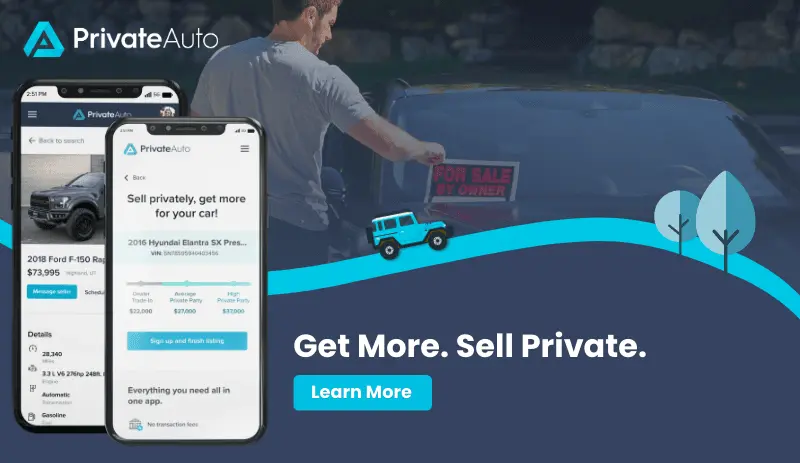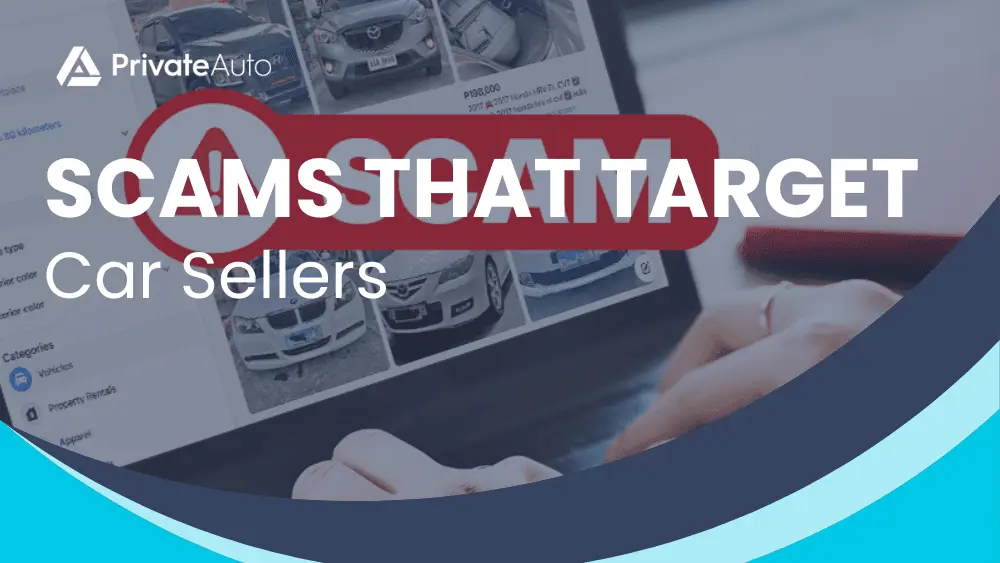Let’s get into more detail on each of these scams, as well as on how you can protect yourself. But first, allow us to introduce a solution.
How to Stop Scams
PrivateAuto is a peer-to-peer car transaction platform that stops scams through smart technology.
- Identification of buyers
- Verification of buyer funds
- E-signing of the bill of sale
- Instant electronic payments (fee-free, unlimited in amount, available anytime, no chargebacks)
It’s easy, secure, and convenient. Experience the magic when you list your car for sale today.
Oh, and if you happen to be selling your car on another platform such as Facebook Marketplace or Craigslist, you can still use PrivateAuto to close the deal and stay safe. Our DealNow bridge product allows you to start a transaction anywhere and finish it on PrivateAuto.
Now, on to the most common scams.

Counterfeit payment scam
One: Counterfeit Cash Scam
There’s a better way to get paid in cash. Skip the grubby bills and get an instant cash transfer with PrivateAuto Pay. So much easier—and safer.
Fake Paypal scam
Two: Fake PayPal Payment Scam
Real PayPal emails use your full name and don’t ask for personal info. Always log in to verify payments directly.
Stay vigilant for fake PayPal emails. Verify through your account and use PrivateAuto Pay. No transaction fees, no limits, and instant fund transfers.
Overpayment scams
Three: Overpayment Schemes
In an overpayment scam, the scammer gives a fraudulent cashier’s check for more than the agreed-upon sale price. For example, you are selling a Ford F-150 for $50,000, and they give you a check for $55,000.
The scammer will plead with you to refund the $5,000 overage back to them right away, often claiming it was an innocent mistake. They may spin an elaborate story to convince you.
But a few days later, that cashier’s check will bounce. Even though you initially deposited the full $55,000, the bank will pull all those funds back out of your account.
You’ll owe the bank $55,000, while the scammer pockets the $5,000 cash you refunded them. Never accept a check for more than the final agreed sale amount.
Phishing scams
Four: Phishing Scams
A phishing scam starts with a supposed buyer contacting you about a listing. They request sensitive information such as the following:
- Copy of driver’s license
- Bank account or routing numbers
- Credit card details
- Social security number
They make seemingly legitimate excuses about needing these details when in reality, they’re stealing your data.
Trust your instinct—and use DealNow.
Fake escrow scam
Five: Fake Escrow Services
You agree on a price, and the buyer claims to fund the escrow service. You may even see proof that the escrow company is holding the money—but the funds are still in the fraudster’s control. After you sign over the car and give them the keys, they take off. Then the check bounces, and the scammer and their money are long gone.
Don’t get duped by escrow scams. Choose a reputable escrow service yourself, rather than letting the buyer suggest one. Better yet, invite the buyer to DealNow with a private link and use PrivateAuto Pay to get the deal done safely.
PrivateAuto Pay gives you escrow-like safeguards so you can sell your car conveniently, securely, and inexpensively.
Test drive scam
Six: Test Drive Scam
By the time you realize what’s happening, the thief and your car are long gone. You’re now a victim of vehicle theft through the age-old test drive scam.
To avoid this, never allow a stranger to test drive your car alone.
Fake loan scam
Seven: Fake Loan Scam
Here’s how it usually goes down: the scammer expresses serious interest in buying your car. “Just one thing,” he says, “I need to take out a loan to cover the full purchase price.”
He then provides some official-looking paperwork showing he’s been pre-approved for a loan from a bank or online lender. With the proof of funds in hand, you feel confident going through with the deal.
You sign over the title and hand him the keys, expecting he’ll complete the loan process and wire you the money soon after.
Never sign the vehicle title and surrender control of your vehicle until you have the actual funds in your account.
Lowballing trade-in values scam
Eight: Lowball Trade-In Value Scam
Don’t get tricked into accepting a dealer’s lowball appraisal. Research your car’s fair market value on Kelley Blue Book or with our vehicle value calculator. Then skip the dealership and sell your car directly to an end user to get the most for it.
Private-party sales are far superior to dealer trade-ins in so many ways. Plus, PrivateAuto makes the private sale process safe, convenient, and fast.
List your car for sale to see how easy it can be.
Identity theft scam
Nine: Identity Theft Scam
Identity thieves are smooth and convincing. They reach out for additional information, saying they need it to proceed with the purchase.
They’ll then ask for sensitive details like your driver’s license number, social security number, or other personal data. If you foolishly provide this info, thinking it’s just part of the normal process, you’re setting yourself up for a world of hurt.
With those key pieces of data, the scammer can open up bank accounts and credit cards under your name. Before you know it, your identity has been hijacked and these fraudsters are racking up debt in your name while ruining your credit.

Stolen credit card scam
Ten: Stolen Credit Card Scam
Car Selling Scams FAQ
Is it illegal to sell a car without disclosing problems?
Private-party car sales are assumed to be “as is,” meaning that the buyer has little recourse after the purchase.
That said, if you knowingly mislead the buyer, you may be subject to criminal or civil penalties. Keep things honest and disclose all defects upfront.
What is the safest site for private car sales?
PrivateAuto is the best site for buying and selling a car privately. We are the world’s only transactional automotive marketplace, powered by self-serve technology to help you get the deal done.
For more information, take a look at how PrivateAuto stacks up against competitors.
How do I know if my car buyer is legit?
PrivateAuto verifies buyers and also verifies funds. Knowing the identity of a buyer—and knowing they have the funds to buy your car—gives you a lot more peace of mind.
What is the safest way of accepting a payment as a seller?
Most private sellers don’t think about safe payment methods until it is time to get paid. The reality is that there are no good ways of transferring large sums of money between strangers. Existing payment methods are risky, inconvenient, expensive, or some combination of these.
– Cash: inconvenient and risky
– Check: inconvenient, slow, and risky
– Bank transfer: inconvenient, risky, and slow, with fees
– Peer-to-peer payment apps like Venmo or Paypal: transaction limits, sometimes fees
PrivateAuto Pay is the best way to receive a payment. It’s so easy, so secure, and so convenient that you’ll never do a deal without it.
Are wire transfers safe in a private car sale?
Wire transfers work as a payment method when selling your car—sort of. They’re slow, inconvenient, expensive, and they involve some risk on your part. They force you to share sensitive banking details with a stranger, and they’re painfully cumbersome. They are one of the easiest ways to scam private sellers.
What are the signs of a fake cashier’s check?
Cashier’s checks include some anti-counterfeiting features. Just like cash, they are designed to be difficult to fake (though that doesn’t stop fraudsters from forging very convincing fakes).
Here are some features to search for if you’ve been given a cashier’s check:
– Legitimate bank name, address, and phone number
– Payee name
– Exact amount for your used vehicle
– Watermark, micro print, or other safety features
Some fraudulent cashier’s checks use a legitimate national bank name but include a personal phone number, where an individual will attempt to impersonate a bank employee. When in doubt, look up the actual customer service number for the bank printed on the check. You can ask the bank itself for its authenticity.
Unfortunately, just because the money is deposited in your bank doesn’t mean the check is good. Banks are required to have your money available in days, but a well-forged check can take as long as two weeks to be identified. While the bank may attempt to track down the scammer, you’ll be required to pay the bank back for the funds, since they were never truly in your account.
